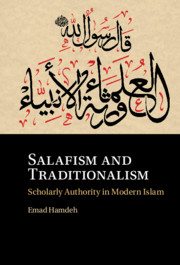
-
Select format
-
- Publisher:
- Cambridge University Press
- Publication date:
- March 2021
- March 2021
- ISBN:
- 9781108756594
- 9781108485357
- 9781108706902
- Dimensions:
- (229 x 152 mm)
- Weight & Pages:
- 0.5kg, 240 Pages
- Dimensions:
- (229 x 152 mm)
- Weight & Pages:
- 0.407kg, 240 Pages
- Subjects:
- Middle East Studies, Islam, Area Studies, Religion
You may already have access via personal or institutional login- Subjects:
- Middle East Studies, Islam, Area Studies, Religion
Book description
One of the most contentious topics in modern Islam is whether one should adhere to an Islamic legal school or follow scripture directly. For centuries, Sunni Muslims have practiced Islam through the framework of the four legal schools. The 20th century, however, witnessed the rise of individuals who denounced the legal schools, highlighting cases where they contradict texts from the Qur'ān or Sunna. These differences are exemplified in the heated debates between the Salafi ḥadīth scholar Muḥammad Nāṣir al-Dīn al-Albānī and his Traditionalist critics. This book examines the tensions between Salafis and Traditionalists concerning scholarly authority in Islam. Emad Hamdeh offers an insider's view of the debates between Salafis and Traditionalists and their differences regarding the correct method of interpreting Islam. He provides a detailed analysis of the rise of Salafism, the impact of the printing press, the role of scholars in textual interpretation, and the divergent approaches to Islamic law.
Reviews
‘This important and timely book not only helps us understand what al-Sisi is referring to but also explains to the reader the roots and history of a clash that has just begun to materialize.’
Hussam S. Timani Source: Reading Religion
‘By presenting in turn the arguments of al-Albānī and those of his detractors, the author offers a guide to understanding one of the most bitter debates (ad personam attacks are commonplace) that plagued Islam in the 20th century and whose repercussions are still felt today, a debate that concerns nothing less than the source of religious authority. For this reason alone, his work deserves to be studied and discussed. However, the author does not simply present al-Albānī in the text; he situates his thought in the context of the fall of the Ottoman Empire, the secularization of politics, and the widespread spread of education. In doing so, he makes an important contribution to the study of the emergence of religious fundamentalisms in the modern world.’
Jason Dean Source: Revue d'histoire et de philosophie religieuses
Contents
Metrics
Altmetric attention score
Full text views
Full text views help Loading metrics...
Loading metrics...
* Views captured on Cambridge Core between #date#. This data will be updated every 24 hours.
Usage data cannot currently be displayed.
Accessibility standard: Unknown
Why this information is here
This section outlines the accessibility features of this content - including support for screen readers, full keyboard navigation and high-contrast display options. This may not be relevant for you.
Accessibility Information
Accessibility compliance for the PDF of this book is currently unknown and may be updated in the future.


